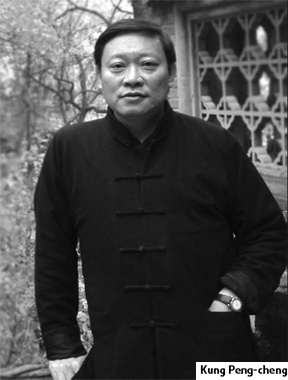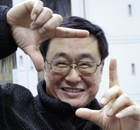Op-Ed Contributors
Confucianism is more about way of life
By Yao Ying (China Daily)
Updated: 2010-01-14 07:52
 |
Large Medium Small |

The world's interest in China, its history, culture and economy is not new. But it seems to have reached a feverish pitch now that the country is poised to become the world's second largest economy. One indication of that is the opening of an increasing number of schools for Chinese culture both in and outside the country. And though not entirely true, Chinese culture has become synonymous with Confucianism.
That's great news for Kung Peng-cheng, a Taiwan resident and visiting professor at Peking University. Kung has always dreamed of seeing the revival of Confucianism.
In his crimson Tang suit with frog buttons, Kung looks more like a man from the late Qing Dynasty. He seems to have stepped out of an even earlier era when he speaks. He is soft-spoken but articulate, quoting from Chinese classics with graceful lan.
|
||||
Kung may be happy at the renewed public interest in Confucianism, but he warns against the tendency of using Confucius' teachings just to make money. It is still too early to say we are in the throes of a cultural renaissance. So, he says, we should do more pragmatic things to carry our culture forward rather than indulging in empty talk about when and how Chinese studies would become a dominant subject worldwide.
"Confucianism is first and foremost about education, because education can make everyone a better person," Kung says. Education can help any person to grow into a wise man. For thousands of years, Chinese people have attached great importance to education. And education has played a vital role in making us better students, better employees and better human beings. But today, society is in danger of losing that tradition, because government spending on education (and cultural development) is inadequate.
Even the Yangtze River Delta region, with all its talents and economic power, doesn't have good universities except in big cities such as Nanjing and Shanghai. Kunshan, an industrial city in Jiangsu province and home to about half a million Taiwan businesspeople, does not have a single institution of higher education. Many enterprises don't even try to retain talented people who could lead them toward sustainable growth.
At the national level, education faces a different kind of problem: uneven distribution of resources. The bulk of government fund goes to the 100-odd key universities and colleges. For example, only three universities are designated as key institutions in Hunan, although the province is about the size of Britain. The rest of the universities and a large number of colleges have to struggle for funds. The case is similar in many other provinces and regions, says Kung, who is former president of Taiwan-based Fokuang and Nanhua universities.
Confucius tried to make education accessible to students from all classes. And education has been an equalizing force since then. Kung's personal experience bears testimony to this. He was born in a poor family, removed from science, philosophy and the arts. But thanks to his education he could still read Chinese classics, albeit with the help of his teacher. This transformed him from a teenager good at street fights into a scholar.

The widening income gap, however, has now made it even more difficult for poor children to go in for higher studies and change their fate. The wealth divide is actually insulating the social classes further.
Of course, the government has to raise its spending on education, Kung says. But it should allow more non-public investors to open schools, too. In Taiwan and Hong Kong, many religious organizations run schools. But on the mainland, Kung says, they rarely do so.
Buying and selling diplomas, plagiarizing theses and the flood of insignificant papers in journals pose another type of threat to higher education, and thus to the basic tenet of Confucianism.
And then we have people who lambasted Confucianism during the "cultural revolution" (1966-76) but today claim to be Confucian scholars. How can we take their thoughts and writings seriously? Kung says.
We should understand Confucianism is a philosophy of practice. It is not just readings of an ancient text to pass exams or write books or to sermonize on. A true Confucian scholar is also a Confucian follower. He has to practice what Confucius taught. But how many people do that?
Under such circumstances, how can we say Confucianism is undergoing resurrection?
A person has to study traditional thoughts seriously either to support or to oppose them. Do we see a lot of people studying Confucianism seriously? Behind all the craze for Chinese studies, in which nationalistic views may have a role to play, Confucianism is still where it has been for a long time: a marginalized subject in universities and a way of living that seems irrelevant in today's society. The reason: our academic set-up, family structure and lifestyle all have changed substantially during the past century, which saw Chinese culture crumble under the weight of Western thoughts and ideas.
People of the Middle Kingdom were self-sufficient and self-contented. But they were closed for centuries, too. So when they came to know the progress Westerners had made in science, education, philosophy and culture, they were overwhelmed; they were overcome by a sense of inferiority.
This prompted them to try and rid their lives of traditional Chinese culture as quickly as possible. And in their rush to embrace everything Western, they conceived the West to be prettier than it actually was. That's why, says Kung, Chinese were more Westernized than the Japanese and Koreans when the latter were going through a similar process. The sad outcome: Many traditional cultural markers, still evident in Japanese society, have been lost in China.
China has followed the West selectively since the May 4th Movement in 1919. Since Chinese misread that Western civilization was only about skyscrapers and cars, they embraced industrialization wholeheartedly and missed out on Western music, literature and arts, sports, philosophy, religion and law.
We don't have to lament this if we learn a lesson from history. "This is the time for double enlightenment," Kung says. "We should not just study Chinese culture, but also see Western culture in a new light." Only by doing so can we know the advantages and disadvantages of Western culture, and avoid evaluating our own traditions wrongly.
Western philosophers have always looked toward ancient cultures such as Greek and Hebrew for enlightenment. Since Voltaire, Eastern philosophy has become another source of inspiration for them. Western and Eastern cultures both can be invaluable resources for Chinese people, and whether they turn them into wisdom or carry them as a burden depends entirely on them.
(China Daily 01/14/2010 page9)













